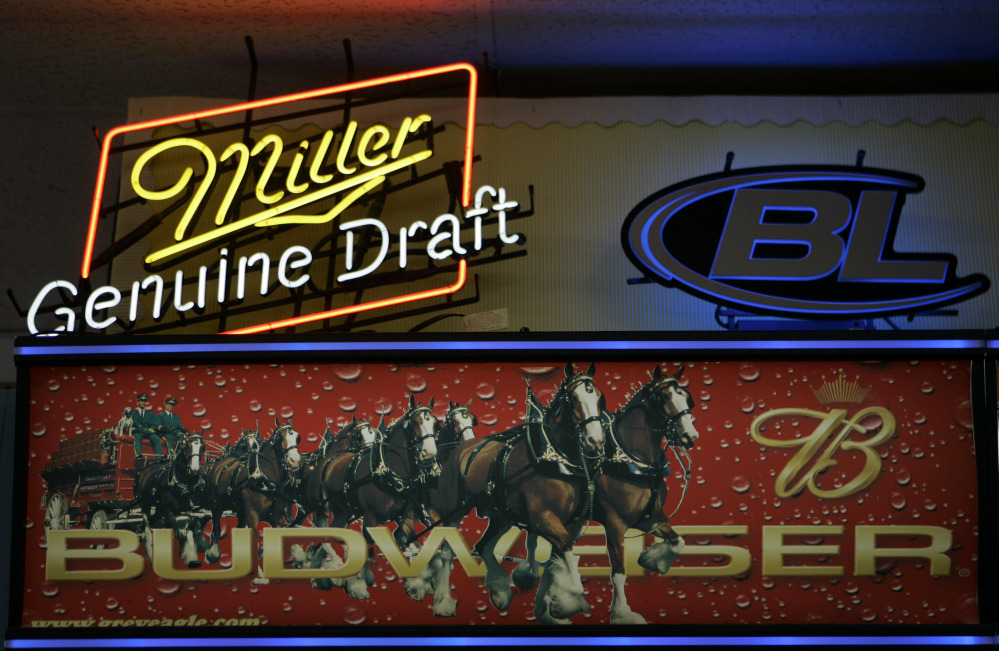Anheuser-Busch InBev won U.S. antitrust approval for its takeover of SABMiller after the maker of Budweiser agreed to give up ownership of the Miller brand and open the door to greater competition from craft beers.
AB InBev will sell SABMiller’s stake in MillerCoors, separating the two brands, and refrain from practices that restrict distribution of smaller rival brews, thus protecting the ability of craft and import beers to compete, the Justice Department said in a statement Wednesday. The settlement will prevent any increase in concentration in the U.S. beer industry, according to the statement.
“The two largest U.S. brewers – ABI and MillerCoors – will now remain independent competitors after the deal,” Sonia Pfaffenroth, a deputy assistant attorney general at the antitrust division, said in the statement. Distributors that sell AB InBev beer “will have the freedom to sell and promote the variety of beers that many Americans drink.”
AB InBev, already the world’s largest brewer, struck the $101 billion deal because it wanted to gain SABMiller’s access to emerging markets in Latin America and Africa. After divestitures, the deal will keep Budweiser, Beck’s and Stella Artois under AB InBev’s roof, while ceding control of brands such as Miller in the U.S. and Peroni and Pilsner Urquell in Europe.
The pending deal has raised alarm in Maine’s growing craft brew community because of concerns that a megacompany would restrict distribution channels needed by small brewers to get their beer to markets such as restaurants, bars and retailers. And that it could buy up raw materials like hops, thereby shutting out craft brewers.
Maine ranks sixth nationwide for breweries per capita, and seventh nationwide for per-capita beer production. Since 2011, the number of Maine breweries has more than doubled, from 34 to 71. In 2014, they collectively employed 1,500 people and reported sales of $432 million.
Even U.S. Sen. Angus King has raised concerns about the merger. He and a bipartisan group of senators last November urged the Justice Department to protect craft brewers from potentially unfair and illegal trade practices by larger beer companies.
“As members with robust craft brewing industries in our states, we ask that you take the necessary steps to ensure that AB InBev’s purchase of SABMiller does not allow the new combined company to squeeze out America’s craft brewing industry,” the group said in its letter to Attorney General Loretta Lynch.
They asked Lynch to “vigorously scrutinize the acquisition and any divestiture plan to ensure that AB InBev does not increase its already-dominant market position through the transaction.”
The brewers still need clearance from China before they can close the transaction. Last month, people familiar with the matter told Bloomberg News that Chinese officials were close to blessing the tie-up after the companies agreed to divest the maker of Snow beer, the world’s top-selling brand.
AB InBev expects to close in the second half of the year.
PROTECTIONS FOR CRAFT BREWERS
The company had moved to address competition problems in the U.S. by offering to sell SABMiller’s MillerCoors 58 percent stake to Molson Coors. Still, the deal triggered concerns among U.S. lawmakers, beer distributors and craft brewers worried about AB InBev’s control over the market.
Craft brewers complained that AB InBev’s incentive system for beer distributors curbed the sale of competing beers by encouraging distributors to carry AB InBev brands.
Under the settlement with the Justice Department, which requires court approval, AB InBev is prohibited from acquiring a distributor if the purchase would cause more than 10 percent of AB InBev’s beer in the U.S. to be sold through its own distributors. The brewer also can’t provide incentives or rewards to a distributor based on the percentage of AB InBev beer the distributor sells compared with the sale of rival beers. The distribution requirements will be in place for 10 years, according to the settlement terms.
AB InBev is required to notify antitrust officials if it purchases a craft brewer, even if the size of the target falls below the legal reporting requirements, so the Justice Department can evaluate the competitive effects of any acquisition.
The agreement to allow the brewing juggernauts combine runs counter to the government’s recent moves against other big deals – the Justice Department and the Federal Trade Commission have killed proposed combinations in the cable, office supplies and oil drilling industries, among others. In this case, the companies proposed asset sales from the start that helped resolve antitrust officials’ concerns.
Shares of Molson Coors Brewing Co., which will buy SABMiller’s stake in their joint venture, climbed 2.8 percent in New York to close at $100.80. AB InBev closed down less than 1 percent at 112.95 euros in Brussels. SABMiller was little changed at 44.25 pounds in London.
Staff Writer Dennis Hoey contributed to this report.
Send questions/comments to the editors.



Success. Please wait for the page to reload. If the page does not reload within 5 seconds, please refresh the page.
Enter your email and password to access comments.
Hi, to comment on stories you must . This profile is in addition to your subscription and website login.
Already have a commenting profile? .
Invalid username/password.
Please check your email to confirm and complete your registration.
Only subscribers are eligible to post comments. Please subscribe or login first for digital access. Here’s why.
Use the form below to reset your password. When you've submitted your account email, we will send an email with a reset code.